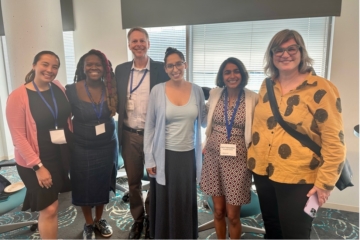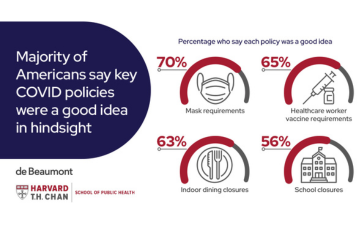In the latest 2020 “Fresh Perspectives” blog post presented by the de Beaumont Foundation, Aysha Pamukcu, JD, left, and Angela P. Harris, JD, explain how we can promote the “civil rights of health” to begin to root out discrimination and make real progress toward health equity.
Pamukcu, founder of Movement Praxis, is an attorney specializing in equitable policy and philanthropy, and previously led the health equity practice at ChangeLab Solutions. She was recognized for her health justice innovations as one of the de Beaumont Foundation’s “40 Under 40 in Public Health” and leads the Policy Fund at the San Francisco Foundation. Harris is Professor Emerita at the University of California, Davis School of Law (King Hall) and most recently was the 2019-20 Visiting William H. Neukom Fellows Research Chair in Diversity and Law at the American Bar Foundation. She is the author of numerous influential books, articles, and essays in critical race feminism and is co-editor-in-chief of the new peer-reviewed, interdisciplinary journal, the Journal of Law and Political Economy.
Who we are, where we live, and how we earn a living all unjustly influence how well and long we live. In the past few months, COVID-19 and widespread civil rights protests have demonstrated how factors beyond our control jeopardize our health, such as holding an “essential worker” job, experiencing housing insecurity, or simply being Black.
It’s clear that justice strengthens public health and injustice weakens it. It’s also clear that SARS-CoV-2 is not the only threat: the virus of racism also endangers everyone’s health and safety. Today’s intertwined crises of a racial health gap and state violence against people of color have proved so intractable that two of our most powerful interventions — public health practice and civil rights law — have struggled to fully solve them.
We — a critical race scholar and a health justice attorney — have proposed the “civil rights of health” as a promising way forward. This approach to health equity allies public health advocates and civil rights lawyers not only with one another, but also, crucially, with social movements for justice.
While institutional and systemic discrimination often operate invisibly, research on the social determinants of health can help make discrimination visible, mapping unjust health disparities across different people and places. This research can enable civil rights advocates to seek systemic change through legislation, administrative action, and judicial decisions. Public health practitioners, in turn, can equip themselves with civil rights law as a tool to go even further upstream — to address discrimination as a root cause of poor health. And justice movements can use this research to educate and mobilize people power in local communities and in the streets.
This three-way partnership of civil rights, public health, and justice movements has the potential to protect the rights of marginalized communities and push our collective imagination toward bolder solutions for health justice. The civil rights of health framework suggests two broad priorities during today’s time of crisis: pursuing anti-racist policy as a public good and equitably enforcing law and policy.
Toward Anti-Racist Policy as a Public Good
As the nation grapples with a global pandemic and racialized state violence, we are coming to terms with the consequences of treating health and its upstream components as private, rather than public, goods. Everyone’s health is jeopardized if, for example, employers can choose not to provide paid sick leave or if evictions deprive families of their ability to safely quarantine. Policymakers are beginning to develop public solutions to these public problems, like universal paid sick leave and eviction freezes.
Yet we still don’t recognize many of the social determinants of health as critical public goods, despite the fact that they can and do serve as front-line defenses against public health threats like COVID-19. One of the barriers to this understanding is a harmful narrative that often underlies policy decisions: the notion that some people and places are deserving of health, while others are undeserving.
As COVID-19 has shown, our collective health is jeopardized by punitive policy. Immigration detention centers become hotbeds of COVID-19 transmission. Sick parents must show up for work and risk infecting their children and coworkers. And across the country, such burdens are disproportionately shouldered by people of color. But they ultimately make everyone less safe.
As communities declare racism a public health crisis, recognition is growing about the far-reaching harms of racism. Using policy to confront systemic racism is a direct challenge to the idea that some people are deserving and others are undeserving of supportive policy. If policy treated all people — including people of color — as deserving of health, our society would collectively benefit.
In this way, anti-racist policy is a public good that is foundational to health justice.
Equitable Enforcement for Health and Shared Prosperity
As the Movement for Black Lives and allied movements have taught us, “race-neutral” policy is not the same as anti-racist policy. Anti-racist policymaking must ensure equitable enforcement of even seemingly race-neutral laws.
In a now-notorious example from 2015, a police officer in Ferguson, Missouri, killed Michael Brown, an unarmed Black man. The officer who killed Brown stopped him for his “manner of walking along roadway,” a misdemeanor offense. Enforcement of such low-level “quality of life” offenses has long burdened residents of Black, brown, and poor communities disproportionately. Thanks to widespread protests, Ferguson catapulted the issue of racialized enforcement into national headlines.
Five years later, Black deaths caused by police continue to spark national grief and protest. The public health community has a critical opportunity to align with civil rights advocates and spur policymakers to view enforcement through a health lens. A punitive and racialized system of fines, fees, and arrests makes marginalized communities sicker and less prosperous.
In some places, local government has sustained itself through penalizing those who can least afford it. Returning to the Ferguson example, a Justice Department report showed that local governments in the region were deeply dependent on the fines and fees garnered by infractions, and that police targeted poor and Black residents for enforcement of low-level offenses.
Ferguson is not unique in this regard; federal benefits policy incentivizes state and local governments to prey on their poorest citizens for criminal enforcement in order to turn targeted funds into general-purpose funds.
Instead of biased, extractive, or predatory enforcement, we need enforcement guided by principles of racial and health justice — in other words, equitable enforcement. Equitable enforcement protects public health, keeps much-needed capital in communities subjected to decades of disinvestment and puts pressure on government institutions to develop other, more equitable funding and financing mechanisms. Justice movements like the Movement for Black Lives can help public health and civil rights advocates create new means of enforcement that are health promoting, equitable, and anti-racist.
Anti-racist policymaking and equitable enforcement can bring us closer to dismantling discrimination and addressing unjust health disparities. We believe an alliance between public health, civil rights, and social justice movements can lay the groundwork to make and sustain that paradigm shift.
Learn more about the intersection of law and public health at these APHA 2020 sessions.
This blog post was first published on APHA’s Public Health Newswire.





